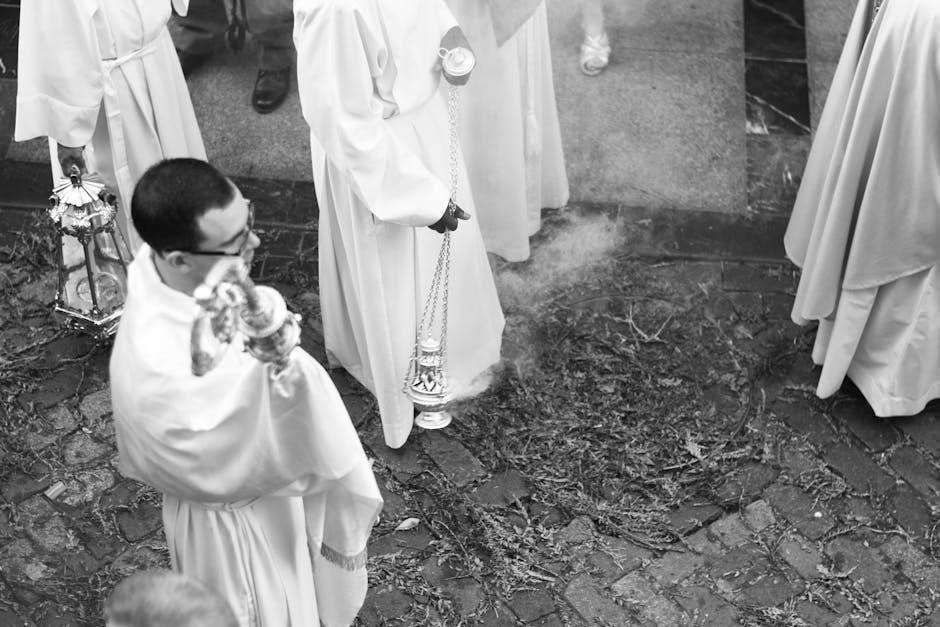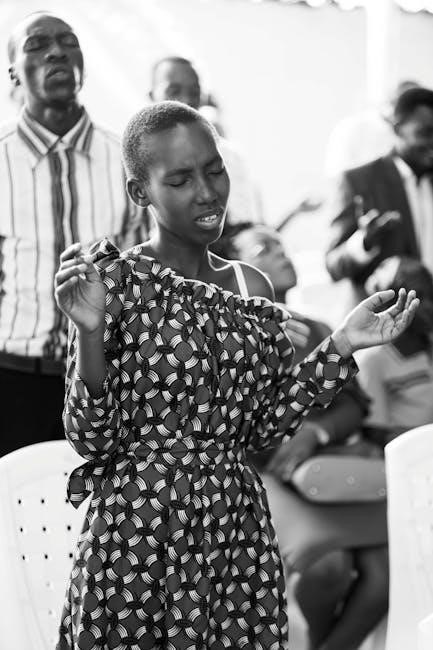The Rite of Christian Initiation of Adults (RCIA) is a process for adults and children over seven to enter the Catholic Church through sacraments. It provides guidance and support for their faith journey‚ emphasizing conversion and discipleship.
1.1 What is RCIA?
The Rite of Christian Initiation of Adults (RCIA) is a process established by the Catholic Church for individuals seeking to join the faith community. It is designed for adults and children over the age of seven who wish to receive the sacraments of Baptism‚ Confirmation‚ and the Eucharist. RCIA is not a program but a journey of spiritual conversion and discipleship‚ guided by the Church’s official ritual text. The process emphasizes the importance of prayer‚ reflection‚ and community support. It is tailored to the needs of each individual‚ ensuring a deep understanding of Catholic teachings and practices. Through RCIA‚ participants are gradually introduced to the life of the Church‚ culminating in full initiation during the Easter Vigil.
1.2 Historical Context and Purpose of RCIA
The Rite of Christian Initiation of Adults (RCIA) traces its roots to the early Church’s practice of initiating adults into the faith through a series of rites and catechetical instruction. Restored in the 20th century‚ RCIA was formalized to address the growing number of adults seeking to join the Catholic Church. Its purpose is to provide a structured‚ sacramental journey for individuals to deepen their faith and become fully initiated members of the Church. The process is designed to foster spiritual conversion‚ discipleship‚ and a lifelong commitment to Christ. By integrating prayer‚ reflection‚ and community support‚ RCIA ensures that participants are well-prepared to embrace the Catholic faith and its teachings. This rite serves as a bridge between the individual’s spiritual journey and the communal life of the Church.

Structure of the RCIA Process
The RCIA process consists of four distinct periods and key stages‚ guiding individuals through spiritual conversion and sacramental initiation into the Catholic Church.
2.1 The Four Periods of RCIA
The RCIA process is divided into four distinct periods‚ each serving a specific purpose in the journey of faith. The first period‚ the Precatechumenate‚ is a time of initial inquiry and evangelization‚ allowing individuals to explore the Catholic faith. The second period‚ the Catechumenate‚ focuses on deeper faith formation through catechesis and community support. The third period‚ the Period of Purification and Enlightenment‚ occurs during Lent‚ emphasizing prayer‚ reflection‚ and preparation for the sacraments. Finally‚ the Period of Mystagogy follows Easter‚ guiding new Catholics in understanding and living their faith. Each period is designed to foster spiritual growth and readiness for sacramental initiation.
2.2 Key Stages and Rites in the RCIA Journey
The RCIA journey includes several key stages and rites that mark significant milestones. The Rite of Acceptance into the Order of Catechumens is a liturgical ceremony where inquirers publicly declare their intention to join the Church. This rite typically occurs after the Precatechumenate period; Later‚ the Rite of Election takes place‚ where the bishop formally acknowledges the catechumens’ readiness for the sacraments. During the Easter Vigil‚ the sacraments of Baptism‚ Confirmation‚ and the Eucharist are celebrated‚ fully initiating the catechumens into the Church. These rites are essential for the spiritual transformation and integration of participants into the Catholic community‚ emphasizing faith commitment and sacramental grace.

The Role of the Parish and Community in RCIA
The parish and community play a vital role in supporting RCIA participants through prayer‚ guidance‚ and hospitality‚ fostering a welcoming environment for spiritual growth and faith formation.
3.1 Responsibilities of the Pastor and RCIA Leaders
The pastor and RCIA leaders play a crucial role in guiding the initiation process‚ ensuring fidelity to the rite and the spiritual growth of participants. They are responsible for leading the parish community in welcoming inquirers and providing formation that aligns with Church teachings. This includes coordinating the RCIA process‚ preparing liturgical rites‚ and discerning the readiness of participants for sacraments. Leaders also collaborate with sponsors and catechists to create a supportive environment for conversion and discipleship. Their role involves prayerful accompaniment‚ ensuring the process is adaptable to individual needs while maintaining the integrity of the Church’s traditions. Effective leadership fosters a transformative journey for those seeking to join the Catholic Church.

3.2 The Importance of Sponsors and the Community
Sponsors and the parish community are essential in the RCIA journey‚ providing spiritual support and fostering a sense of belonging. Sponsors accompany participants‚ offering guidance‚ prayer‚ and witness to the Catholic faith. Their role is to walk alongside candidates‚ sharing their own faith experiences and helping them navigate the process. The community‚ through its prayers and hospitality‚ creates a welcoming environment that aids in the participants’ conversion. This collective involvement reflects the Church’s communal nature and emphasizes the importance of faith shared and lived together. The support of sponsors and the community helps participants feel embraced and valued as they grow in their relationship with Christ and prepare to receive the sacraments.
The Spiritual Journey of RCIA Participants
The RCIA journey focuses on spiritual growth‚ conversion‚ and deepening faith through prayer‚ reflection‚ and discipleship‚ guiding participants toward full communion with Christ.
4.1 Conversion and Discipleship in the RCIA Process
Conversion and discipleship are central to the RCIA process‚ fostering a deep transformation in participants. This journey involves a personal encounter with Christ‚ leading to a life of faith‚ prayer‚ and service. Through catechesis and reflection‚ individuals grow in their understanding of Catholic teachings and commitment to following Jesus. The process encourages ongoing conversion‚ helping participants to discern God’s will and integrate their faith into daily life. Discipleship is nurtured through community support‚ liturgical experiences‚ and spiritual guidance‚ preparing individuals for full initiation into the Church through the sacraments. This spiritual growth is a lifelong journey‚ rooted in love for God and neighbor.
4.2 The Role of Prayer and Reflection
Prayer and reflection are essential components of the RCIA process‚ fostering spiritual growth and deepening participants’ relationship with God. Through prayer‚ individuals encounter Christ‚ discern His will‚ and cultivate a life of faith. Reflection‚ particularly on Scripture and Catholic teachings‚ helps participants integrate their beliefs into daily life. The RCIA process encourages regular prayer practices‚ such as meditation and liturgical participation‚ to nurture spiritual maturity. Reflection also involves self-examination and dialogue with sponsors and the community‚ guiding participants toward a deeper understanding of their faith journey. By emphasizing prayer and reflection‚ the RCIA process helps individuals develop a lifelong habit of seeking God’s presence and living as disciples of Christ.

Key Rituals and Sacraments in RCIA
The RCIA process includes key rituals such as the Rite of Acceptance and the Sacraments of Baptism‚ Confirmation‚ and Eucharist‚ marking spiritual milestones central to the journey of initiation into the Catholic Church.
5.1 The Rite of Acceptance into the Order of Catechumens
The Rite of Acceptance into the Order of Catechumens marks the first formal step in the RCIA journey. During this ritual‚ inquirers publicly express their intention to follow Christ and are accepted into the catechumenate. The rite typically includes a prayer of blessing‚ the imposition of hands‚ and the presentation of a catechumenal cross. This step signifies the transition from the pre-catechumenate period to the catechumenate‚ where participants deepen their faith through formation and reflection. The community welcomes them‚ offering support and prayer as they progress toward the sacraments of initiation. This rite is a powerful moment of commitment‚ affirming the catechumens’ desire to embark on the journey toward full initiation into the Catholic Church.
5.2 The Sacraments of Initiation: Baptism‚ Confirmation‚ and Eucharist
The Sacraments of Initiation—Baptism‚ Confirmation‚ and the Eucharist—are the culmination of the RCIA journey. Baptism washes away sin‚ rebirths the individual in Christ‚ and initiates them into the Church. Confirmation strengthens the faith‚ imparting the Holy Spirit’s gifts for witness and mission. The Eucharist‚ the source and summit of Christian life‚ unites the newly initiated with Christ and the Church through Holy Communion. These sacraments are typically celebrated together at the Easter Vigil‚ marking the participant’s full initiation. Together‚ they transform the individual‚ enabling them to live as disciples of Christ and participate fully in the life of the Catholic Church.
